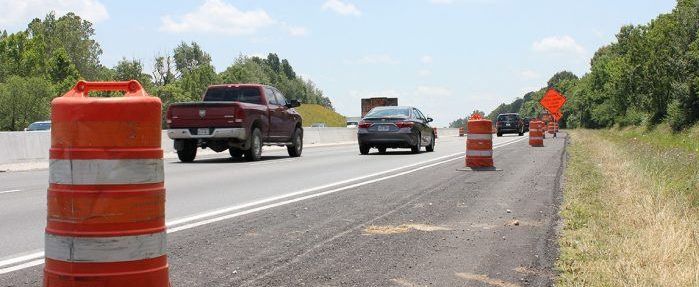Rep. Andy Davis: ‘Everything on the table’ for potential highway program
by January 27, 2019 9:55 am 1,471 views

A permanent half-cent sales tax for roads. An increase in the motor fuel tax. Registration fees, revenue transfers, and reforming the procurement process.
These are all ideas being floated to craft a highway funding plan in the Arkansas Legislature, according to Rep. Andy Davis, R-Little Rock, who is one of several lawmakers in the middle of discussions.
Davis appeared on this week’s edition of Talk Business & Politics to discuss a highway plan and Gov. Asa Hutchinson’s state government reorganization effort.
“I think any highway plan is going to have to be a combination of several things. It could be sales tax, it could be motor fuel tax. It could be registration fees. It could be some revenue transfer. Everything has to be on the table. Highway funding has got to be one of the most complicated problems to solve,” Davis said.
Not only is the dollar amount needed for roads in the hundreds of millions of dollars, but due to Arkansas’ tax code, the threshold for passage of certain taxes can range from a simple majority of 50%-plus-one to a three-fourths vote on some taxes. Other solutions may require constitutional changes due to the independence of the Arkansas Highway Commission through the Mack-Blackwell Amendment passed in 1952.
Davis, an engineer, said repairing Arkansas’ highways could use an injection of $150-$200 million annually, while new construction for areas of the state stressed by growth could double that amount needed.
“The number to me goes back to the governor’s highway funding work group,” he said. “We set some incremental goals. And the goal that we need to be hitting right now to me is between $150-$200 million. I personally would set that aside for safety and maintenance needs and not necessarily new construction. Long-term eight to ten years was closer to $400-500 million dollars.”
While discussions have taken place about reforming the amendment that created the state highway commission, Davis thinks changes to that are unlikely. He said legislators are more interested in understanding how projects get prioritized and funded.
“I don’t know if there will be any attempts to change the commission itself. I do think there will be attempts to try to bring more light inside of the legislature and the executive branches to how things are done inside the highway department,” Davis said. “We’ve made some efforts of that in the past but I think there’s a continued desire to know more about how do we fund certain projects, how do we procure projects, things like that. And so certainly reform is a big part of this highway funding initiative. Just about everyone agrees we can’t do it the way we’ve always done it in the past. There need to be some reforms.
“I think a lot of them [legislators] don’t know what they don’t know and that’s kind of what bothers them. We just spent a couple of years with a procurement consultant going through procurement of everything else in state government that doesn’t cover highways,” he said. “Some things they learned there have raised questions on the highway side. So I think they would just like to know more about how the process is done.”
Davis also updated on Gov. Hutchinson’s state government reorganization plan, which would combine 42 state agencies, boards and commissions into 15 departments reporting to the governor.
Hearings began last week on the overhaul effort. Davis said there will be 16 bills filed in various committees so that conversations regarding the transformation effort’s impact can be explored. Eventually, the 16 bills will be combined into one omnibus bill for a vote in both chambers of the General Assembly.
While there appear to be no strong roadblocks, according to Davis, he said there have been requests for clarification in certain areas. He also expects a Department of Finance and Administration report to be delivered this week that will outline a potential $15 million in annual savings from the reorganization.
“It’s hard to say exactly where it’s going to come from,” he said. “We know that savings will occur because we’ve done reorganizations on a smaller scale over the past few years. We’ve moved lottery under DF&A. Rural Services under AEDC, and things like that. So we can document those savings. It’s hard to say upfront what they’re going to be exactly.”
You can watch Rep. Davis’ full interview in the video below.
